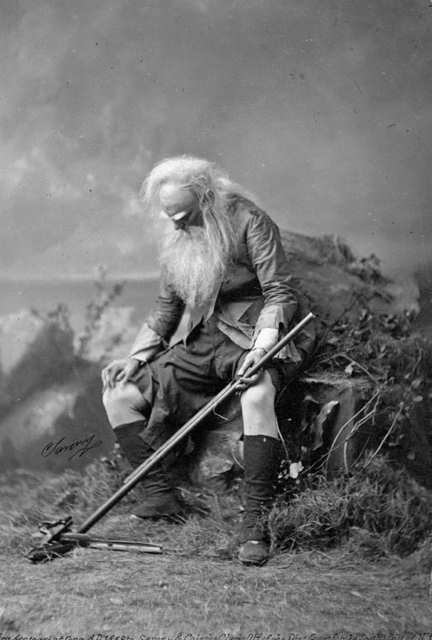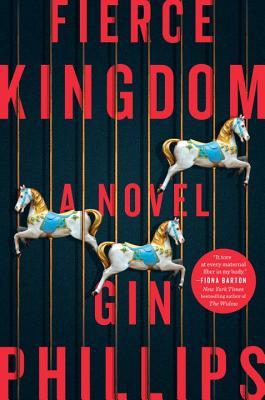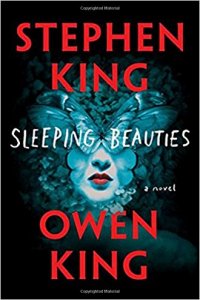
And he's right, so here it is!
Traditional English folk songs can be history (a little mossy, a little mutated), myth retold (look, everyone really wants to go to Elfland, if they can just figure out a way to come out alive), news (remember when Alisoun got shot cause they thought she was a swan?), and the occasional unique idea (I'll let you know when I find one). They're all sung in a minor key, and can be very haunting. That's why they're still being sung. And why I still listen to them.
But let's break down these categories a bit:
Most of English folk songs have people dying of a broken heart. "Barbara Allan" is actually unusual, in that it's the lass that's hard-hearted (although she does die for her dead lover in the end: "my true love died for me today, I'll die for him tomorrow"). Most of the time it's the lass that got knocked up on velvet green and was abandoned who dies of sorrow (and sometimes childbirth). But there's a lot of broken hearts, and there still are. For one thing, it's hard to get to a ripe old age and never have your heart broken once. And sad songs are cathartic. There's nothing like a good cry, especially when accompanied by alcohol and maybe a group sing-along in the bar...
The amazingly large number of deaths by drowning makes just as much sense. Drowning was actually a major cause of death in the Middle Ages because:
(1) People drank a lot. Beer in the morning, beer at midday, beer at night. Granted, a lot of it was small beer, but there wasn't any caffeine in those days, and the water wasn't safe to drink and they knew it. And even if it was, they were still going to drink beer. Or wine. And if anyone offered them some whiskey, well, they wouldn't turn it down.
(2) Almost every village and every city was built along water, because water was necessary for cooking, transportation (barges were the equivalent of modern semis), power (mills), and the occasional cleaning. This meant there was lots of water to fall into while drinking, either from the banks, bridges, or well. You combine drinking with darkness, and stumbling along home after a few pints at the pub could lead to serious injuries and more drownings. And the Middle Ages were not known for their seating: it was common to sit down on a bridge or the edge of a well and have a long pull at a noggin, and tip back, back, back... Well, watch Oliver Reed in "The Three Musketeers" above...
(3) All that alcohol and water gave you a handy place to toss someone you were tired of, whether it was your spouse, your friend, or the occasional stranger.
Cruel wars... Well, there's still, sadly, a lot of those. Of course, back then men were often pressed into service at sea or land, against their will, or deliberately inebriated by recruiters and signed up, or ran off to join the wars, any wars. Most of the sad songs are about peasant lads being pressed into service and never seen again by their own true love... Sometimes the loved one goes off in search of her true love, but that rarely ends well, either.
NOTE: The most amazing story is a real one: "The Return of Martin Guerre" is about a peasant who went off to the wars, leaving his wife and family, and returned many years later and resumed his life as husband, father, peasant and all was well... until the real Martin Guerre came back from the dead, years after that, and booted the imposter out and up onto the gallows. The movie, starring a young Gerard Depardieu and Nathalie Baye, is magnificent.
Execution... not so often, and usually NOT for being a highwayman or a footpad. Although there are lots of serial killers, then and now. And there are songs about the victims of said serial killers, such as "Reynardine", in which the lass is led over the mountains by a serial killer werefox cannibal "whose teeth did brightly shine".
But most are about escaping Bluebeard types in the folk songs, legends, stories, and fairy tales: a man who marries successive wives and kills them all, except the last who somehow figures a way out of it. My favorite version is Grimm's "The Robber Bride". I was fascinated as a child by the three glasses of wine the Robber gave his victims (one white, one red, and one yellow, which knocked them out), grossed out by the dismemberment (read it yourself HERE), and cheering when the Bride cleverly exposes him at the wedding feast, and he and all his band are executed.
Another version of nailing Bluebeard is a very old folk song called "The Outlandish Knight". Flora Thompson quoted hugely from this in her memoir "Lark Rise to Candleford", because she heard it almost every night from the local inn, as old David sang it to wind up the evening's drinking:
"He turned his back towards her
To view the leaves so green,
And she took hold of his middle so small
And tumbled him into the stream.
And he sank high and he sank low
And he sank high and he sank low
Until he came to the side.
'Take hold of my hand, my pretty ladye,
And I will make you my bride.'
'
Lie there, lie there, you false-hearted man,
Lie there instead of me,
For six pretty maids hast thou drowned here
And the seventh hath drowned thee.'
"The Outlandish Knight" is a variation of "Lady Isabel and the Elf Knight". (See Steeleye Span's version.) There's a lot of songs about Elf Knights, Elf Queens, and elves in general, and all I can say is, you don't want to go there.
Except you do. Because it's an incredible place, full of mystery, beauty, glamour, and as long as you're there you'll never get old. And who knows? You may be as lucky as Thomas the Rhymer, who returns with the gift of prophecy and poetry...
Nonetheless, it can end badly, unless your true love comes to fetch you, like in Tam Lin ... Otherwise... I'd stay home.
And now we come to the last two:
"Wandered off, lost in the woods, and died". One variant is the Babes in the Wood, a/k/a Hansel and Gretel, who were either murdered or driven out to starve to death in the woods... and do. (The frequency of these tales can make you wonder about human nature. Then again, having just seen this on the news, maybe not...)
 The other variant is Rip Van Winkle, who drank the wrong wine / ale given to him by ghosts / elves / trolls, falls asleep, and awakens a hundred years later, which means that all his generation thought he died. While Washington Irving based Rip Van Winkle on a Dutch story, "Peter Klaus", it's a very old legend. The first go-round apparently was when, in the 3rd Century BC, the Greek historian Diogenes Laertius told the story of a shepherd, Epimenides of Knossos, who fell asleep in a cave and woke up decades later. But it might well be older than that. There are tales of long sleepers in the Orkney Islands, where a drunken fiddler meets up with trolls, in Ireland, China, Japan, and India. The Babylonian Talmud tells a version of it. Who knows? There are probably some in ancient Egypt and Sumer. This is VERY old stuff.
The other variant is Rip Van Winkle, who drank the wrong wine / ale given to him by ghosts / elves / trolls, falls asleep, and awakens a hundred years later, which means that all his generation thought he died. While Washington Irving based Rip Van Winkle on a Dutch story, "Peter Klaus", it's a very old legend. The first go-round apparently was when, in the 3rd Century BC, the Greek historian Diogenes Laertius told the story of a shepherd, Epimenides of Knossos, who fell asleep in a cave and woke up decades later. But it might well be older than that. There are tales of long sleepers in the Orkney Islands, where a drunken fiddler meets up with trolls, in Ireland, China, Japan, and India. The Babylonian Talmud tells a version of it. Who knows? There are probably some in ancient Egypt and Sumer. This is VERY old stuff.Also (imho) old, old, old stuff is "being mistaken for a swan by a trigger-happy hunter." I totally buy this one. For one thing, swans used to be eaten, in ancient Rome, in Elizabeth times, and on. They were apparently a delicacy. Anyway, hunting them used to be common. And God knows it still happens, although they're not taken for swans anymore. Back in November, 2017, a Pennsylvania woman, out walking her dogs, was shot by a hunter who mistook her for a deer. (Newsweek) November was actually an interesting month for mistaken shootings: another hunter in New York shot a brown pick-up that he mistook for a deer, still another up in Hebron, Maine killed a woman on the opening day of hunting season, and yet another hunter in Oxford, Maine shot a man in the arm. Personally, I'm staying away from the Northeast during hunting season.
Anyway, as you can see, the "Causes of Death in Traditional English Folk Songs" can all still be used today by the modern mystery writer. Our victims can die of a broken heart, accidents, drowning, drinking (or drugs), execution, serial killers, escaping serial killers, Elf land (think cults of all kinds), babes in the wood, and hunting accidents. The technology may change, but the ways, and the motivations, stay pretty much the same.

And you could do worse than to start with folk songs...







































